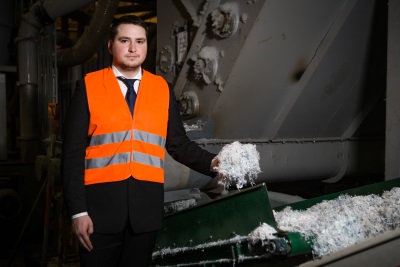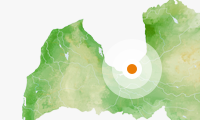
In order to increase the capacity and efficiency of production, recycling company SIA Nordic Plast plans to make investments of approximately three million euro
Recycler of used polyethylene LDPE films and HDPE hard plastic products, SIA Nordic Plast, has overcome difficulties and aligned the internal processes. Manager of the company Andris Trumars states that the last year for the company has been sort of a year of reincarnation after 2016, which was comparably unsuccessful. The reason for problems had been comparably high prices of raw materials since 2015. It continued, and therefore many experiments with raw materials were done to produce the products of appropriate quality. He admits that not all experiments had been successful. Last year, it helped that China closed its market for import of waste; therefore, prices of raw materials went down, there were more options to vary and produce higher quality products.
Second-hand use
"We recycle packaging and various residual films, as well as such films that are collected from the residents in the sorted waste containers; therefore, those are with biological and other impurities. We also recycle so-called big bags that are mostly used in agriculture for storage of land supplements.
We recycle also bottles of shampoo, cans and other products of hard plastic. As a result of recycling are created granules that can be used for production of new end products, for example, plastic bags, construction films can be produced, various products may be molded, etc. Range of products that can be made from granules is very broad," said Mr Trumars. He also explains that granules differ depending on the used raw material. For example, if the film of the raw material is colourful, the granule will be grey. Transparent film creates transparent granules. Once a month, the factory produces approximately 650 tonnes of various granules; and approximately seven thousand tonnes per year. It should be mentioned that granules are an alternative to oil products because they are a result of recycling; therefore, it is possible to save natural resources. "The industry is very interesting: if a couple years ago it was believed that waste recycling area is dirty and primitive, currently it is more similar to chemical production because requirements for the end product only increase, so that it can be used in as many various solutions as possible and to ensure the economy of circulation. At the moment, practically any film can be recycled; the only question is of what materials it has been produced because there are hundreds of types of plastic, and whether this raw material can be obtained of a sufficient quantity so that recycling would be economically profitable," explained Mr Trumars.
Export card
Only a small part of the products manufactured by SIA Nordic Plast is sold in Latvia. Namely, approximately 97% of the manufactured products are exported; and it is due to the fact that the industry of production of end products has not been developed in Latvia. "We export large amounts to Lithuania, where there are really many companies that produce other products from granules. The same way, our products are lately sent to Poland, Germany, Finland, the Netherlands and also to Czech Republic as well. The number of export markets is sufficient for our current volume of produced granules. However, the work surely does not stop, and we continuously work on market research, attraction of new customers and further development," stated Mr Trumars. When asked where the raw materials are obtained, he answered that quite a large quantity is bought also in Latvia, up to 35% of the whole volume, but the rest comes from Lithuania, Finland and other European countries. The warehouse constantly maintains provisions of raw materials so that the work at the factory would not be interrupted. The company practically works only with the raw material prepared by the waste sorting factories. Nothing is bought directly from the population, and nothing is sorted at the factory. Mr Trumars remarks that the quality of raw materials could always be better, of course; the quality of granules depends on it. "I think that great investments in waste sorting factories will be necessary in Latvia in order to ensure the necessary quality of raw materials and for further processing to be faster. It will be required by the EU regulations. The better the raw material has been sorted, the better will be our product, and the general situation with the waste management and processing in Latvia as well," Mr Trumars added.
Ability to compete
Competition is sufficiently strong in this area of recycling, and Mr Trumars expects it yet to increase. In relation to closing of the Chinese market or China ban, as already mentioned, it has been estimated that a total of approximately 200 recycling companies will be established in Europe. It would be the necessary number to recycle the volume of sorted waste remaining in Europe and not sent to China. "Therefore, competition will increase, but I see that also the number of end product manufacturers increases at the same rate as the number of recycling company, and the demand for granules does not decrease. Increase of recycling manufacturers has been calculated for the current quantity of raw material. We are the largest recyclers of this type in Latvia. Nearest and largest competitors are located in Lithuania," shared the manager of the factory. In order to keep up with other competitors, expansion of processing and production, as well as automation and upgrading of processes in general is planned. Currently two projects with the co-financing of the European Union (EU) have been approved. One of these provides for upgrading of the current line. Additional washing and sorting equipment will be installed, allowing for a more effective process and increase of production capacity by approximately three thousand tonnes per year. Investment of approximately three million euros is planned in upgrading. Last year, approximately 100 thousand euros have been invested in efficiency and automation of processes. Within the framework of the second project, purchase of the second processing line has been planned for the processing of films. Currently, a large part of work at the factory still takes place manually, but work on automation takes place. The factory also includes a small laboratory for all basic quality measurements. To conduct more enhanced studies and product research, SIA Nordic Plast cooperates with Riga Technical University (RTU).
BUSINESS FACTS
SIA Nordic Plast
- Locations: Olaine
- Established: in 2000
- Owner: SIA Eco Baltia grupa
- Employees: 100
- Turnover last year: 6.5 mln euro
- Export: Lithuania, Finland, Poland, Czech Republic, Italy, Sweden

